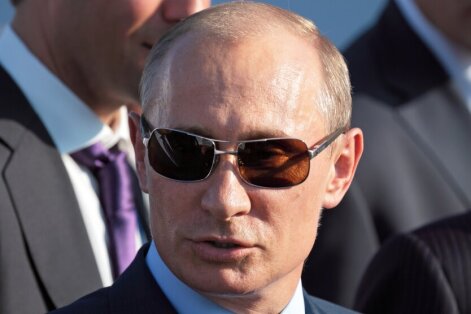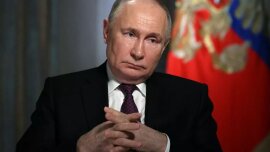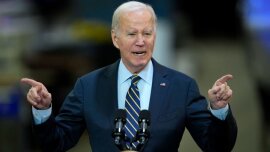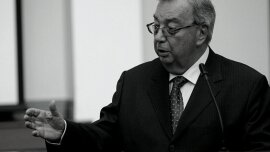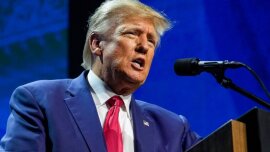So, on Monday, in the Western media, with reference to the national security adviser, information appeared that the meeting between the representatives of the United States and the Russian Federation would take place on January 10 where the question of a possible Russian attack on Ukraine will be one of the key ones. And today, at Putin's request, a telephone conversation between the presidents of the United States and the Russian Federation will take place.
I note right away that you should not overestimate its possible results, given the hysteria that has been whipped up in the media over the past months in the style of “Tomorrow Putin will definitely attack!” As much as many people in our country would not want to believe this, Ukraine is not the “navel of the Earth” and issues related to it, in particular the settlement of the conflict in Donbas, are one of many on the US international agenda.
It is much more important for the Biden administration in the short term to resolve the issue of Iran's return to the "nuclear deal" after the unilateral US withdrawal from it under Trump, which only brought Iran closer to possessing the amount of enriched uranium necessary to create a nuclear charge. Yes, sanctions cause significant economic damage to Iran. But they did not lead to the overthrow of the Ayatollah regime, but the number of centrifuges that enrich uranium has increased many times since the introduction of new sanctions under Trump. But it was precisely the "nuclear deal" with Iran that even the most ardent opponents of Obama in the expert community considered him the main achievement in the field of international security during his two terms of presidency. And here Russia, as a participant-guarantor of agreements and a situational ally in the confrontation with the West, can help Biden to seat Tehran at the negotiating table with Washington and make concessions.
The same applies to the conflict in Syria, which has long ceased to be civilian and in which all regional players are involved, including Iran, Israel and Turkey. And also Russia, thanks to whose entry into the conflict on the side of Bashar al-Assad in 2015, he managed to retain power in critical days on the battlefield.
By the way, Syria is a very illustrative example for us. Alas, negative. Indeed, from the very beginning of the confrontation with the Assad regime, one of its main opponents were the Kurds, who dreamed of finally getting statehood. But Trump openly "threw" them in the second half of his cadence, deciding to stop supplying them with money and weapons for resistance. By that time, Turkey officially got involved in the conflict, ignoring the right to the sovereignty of Syria, guided by its own national security interests. Indeed, millions of Kurds also live on its territory in the regions bordering on Syria, who also dream of statehood. Naturally, not as part of Turkey.
As a result, the Kurds had to say goodbye to the dreams of their state at the moment, at least for a while. And the regions of their compact residence in Syria have become in recent years the site of regular local clashes between PMCs of the Russian Federation and Turkey. Those very private military companies whose activities are prohibited by law in Russia.
That is, if the conflict in Donbas, inspired by the Kremlin in 2014, as well as the participation of Wagner PMC in it was a novelty for the world community, then by 2021 this practice expanded throughout the Middle East region and even went beyond it to Africa. And now both Turkey and other countries that are involved in regional "hybrid" conflicts have PMCs.
And to end the conflict in Syria and overthrow the Assad regime, the US government spent dozens, if not hundreds of times more than on aid to Ukraine in all eight years of the Russian-Ukrainian conflict. And in the list of priorities of international security for the United States, this conflict has always been much higher than in the Donbas.
Even the solution of these two issues with the help and participation of the Russian Federation will bring much more electoral dividends to Biden and the Democrats on the eve of the midterm elections to the US Congress next November. On which the question will be decided whether the Democrats will retain control of at least the Upper House of the US Congress, on which all appointments to key positions and funding of the initiatives of the Biden administration depend.
And then there is Afghanistan, in which the Taliban seized power, the migration crisis on the border of Belarus with Poland as a new mechanism of Kremlin pressure on the European partners of the United States, who definitely want to eliminate this problem as soon as possible. There is, after all, Libya, where large oil reserves are concentrated, which is also the source of the flow of migrants to the EU. I'm not even talking about the work on the preparation of a new Treaty on the reduction of nuclear weapons and their means of delivery to replace New START (treaty between the United States of America and the Russian Federation on Measures for the Further Reduction and Limitation of Strategic Offensive Arms - ed), which Biden extended in the first month of his presidency without any additional conditions, unlike Trump. When they did not even think about starting to write in the Ukrainian media "why Biden did not call Zelenskyy". Undoubtedly, work on such an agreement will take a lot of time and effort, and its signing is most likely calculated by the White House for the next presidential election as an achievement in the field of global international security.
In general, I have given enough examples of topics, but not all, which will be discussed by the representatives of the United States and the Russian Federation in January. And later on. This will be a regular working meeting at the level of specially created groups in the foreign affairs agencies and not only, which began their joint work in the spring and who are discussing possible solutions on these and other issues. Yes, the Ukrainian question will undoubtedly be one of the main ones. And it is no coincidence that it is the American media that are the sources of constant leaks from the Biden administration that Putin is about to attack. This entire information campaign to whip up fear and threats of a full-scale war involving a still superpower in the military sphere began in the United States and it is from there that the most alarming news about the risks of a Russian attack on Ukraine comes from. But in this way, the Biden administration is killing two birds with one stone:
First, it increases the level of importance of the problem being solved. Frankly, the conflict in Donbas and its settlement, starting at least in 2015 after the signing of the Minsk agreements and the suspension of the hot phase of the conflict, has not been in the focus of attention of the American media and society for a long time. Clinton did not name it among her foreign policy priorities when she went to the presidency in 2016. I won't even talk about Trump. But since then, Ukraine has firmly established itself as almost the main source of scandals in the presidential race in the United States. And if for Trump it all started with a scandal with the head of his campaign headquarters Manafort and his accounts in the “granary book” of the Party of Regions, it ended with impeachment in the Lower House of Congress, the reason for which was the very first conversation with President Zelenskyy after his election. In which the US President asked Zelenskyy to reopen a criminal case on corruption involving the son of the then-candidate, and now the current US President Joe Biden.
We all remember the "Derkach tapes" with conversations of the alleged presidents of Ukraine Petro Poroshenko and the then US Vice President Joe Biden. There is still no expert examination of the recordings of the conversations, therefore, "supposedly." Although the voices are very recognizable. Their publication in the midst of the 2020 presidential race was an obvious attempt to influence their outcome towards Trump and discredit Biden. We need to pay attention to two more signals to Zelenskyy this year.
The first is the introduction of personal sanctions by the US State Department against Verkhovna Rada deputies Derkach and Dubinsky even before President Biden took office.
The second signal is the "leaking" of the conversation between the head of the President's Office, Andrei Yermak, and then Trump's adviser Rudolph Giuliani (against whom criminal cases are ongoing in the United States and has already been deprived of his lawyer's license) this summer, after Biden's meeting with Putin in Geneva. When the President's Office dispersed the news in the media that Zelenskyy's visit to Washington will take place in the next month and there is already agreement to meet with him from the US President.
I take these two signals from the Biden administration as a reminder that there are still questions to Zelenskyy about his "neutrality" in the 2020 US presidential elections. And the sediment, as they say, remained. Moreover, this is a personal question. And the theme of children for Biden, who is familiar with his biography, is a weak point, full of personal tragedies.
So there has been plenty of special sympathy, taking into account not only these factors, but also the numerous violations of their own promises and agreements over the past year, given to Biden personally by Zelenskyy. The extreme scandal and violation of the promise made by Zelenskyy during his visit to the White House on September 1 - the end of the competition and the appointment of the head of SAP - a key new law enforcement agency created at the initiative and financial assistance of the United States. Read on "Censor" how it all happened quite recently. “Spanish shame,” in one word.
I remember that at one time in the American media, citing a source close to Trump, there was news that he, in his hearts behind closed doors, called Ukraine "the most corrupt country in the world." Then Poroshenko was still president, by the way. For balance. In both countries presidents were replaced, but Ukraine still remains a headache and a source of problems for the US leadership. And it is absolutely logical to assume they would like to get rid of this headache with pleasure.
Especially if Putin has been ready to get this "headache" for eight years, saying: “Well, why do you, Joe, need this headache? Have you really not understood in eight years that this is a "non-state" as I said back in 2008 to your predecessor Bush Jr. in Bucharest at the NATO summit? Well, or "failed state", as you like to say. Was there not enough Afghanistan, from which you barely carried your legs twenty years after the invasion? In general, let's come to an agreement, and turn it back into the sphere of my, that is, Russia, interests! "
And he quickly drew up a list of his proposals on the entire agenda, including documentary evidence of Ukraine's non-entry into NATO. Well, while providing the American media with informational reasons, "rattling" weapons at our borders. In addition, since Monday, migrants from the Middle East on the Belarusian-Polish border have become more active, again taking up the storming of the Polish border, not without the help of Lukashenko's special services.
In fact, Putin put forward to Biden, as the leader of the United States and the collective West, his proposals on the so-called "big deal" and the division of the spheres of influence of the parties, as well as interaction on international security issues. What Biden and Putin were able to agree on six months ago in Geneva, after six months allotted by Biden himself for their implementation, it is still impossible to say for sure. It is only obvious that they also concerned Ukraine, as Putin himself said after the meeting, but under the influence of external and internal circumstances, not all of them were fulfilled. Because of the same disastrous withdrawal of the American contingent from Afghanistan. It is also obvious that it is difficult to call the flight into the stratosphere of quotations for natural gas on the spot market in Europe, which began just after the summit in Geneva, as a coincidence.
By the way, Biden was in no hurry to lend a helping hand with gas supplies to his Euro-Atlantic partners for a long time, when their demand for it increased many times this fall. And all the American liquefied gas at that time went to China or Brazil, where prices were even higher than in the EU. And this while escalating a tense situation due to military exercises by China itself around Taiwan, to which Washington also has obligations for military assistance and security guarantees!
In general, if we compare the statements of the White House in the Western media against Russia and China in the context of the global confrontation for world leadership of authoritarian regimes with democracies (the so-called "Biden doctrine", which may soon be documented) led by the United States with real actions and the level of interaction between China and the United States in the economy at the level of private business, there is a strong impression that we are all being deceived. The same applies to the synchronous actions of China with the United States on the issue of the "green transition", namely, the decision to close coal-fired power plants and mines in China this year. Which has already significantly influenced the demand, and hence the rise in gas prices all over the world. And from which, by the way, Russia, and American companies producing shale gas, and the US stock market, on which futures for its deliveries are traded, benefit. And Wall Street, as you know, is almost the main sponsor of the Democratic Party.
Only now Ukraine, which, unlike Germany or France, does not have long-term contracts for its supply, found itself in just a few months on the verge of an energy crisis. Lack of gas and coal, as well as unaffordable gas prices for industry, in turn, can provoke a collapse of the entire economy of the country. This will certainly be followed by non-payment of wages at enterprises that will be forced to close (and they are already closing or at least cut their work), due to the inability to produce their products at such gas prices, massive unemployment and, as a result, mass protests of the population. And for this, all this is necessary, according to the calculations of energy specialists, so that severe frosts in February would last only a few weeks.
All this, of course, is very strongly and extremely negatively reflected in the negotiating positions of Kyiv with Moscow. Zelenskyy continues to reiterate in his interviews about his willingness to negotiate directly with Putin. Only the head of the Kremlin, not to mention his courtiers, does not miss the opportunity to "prick" Zelenskyy, openly calling him a "puppet" in the hands of the US special services, refusing direct negotiations. Perhaps in Moscow.
The Kremlin has long voiced the list of issues for discussing bilateral relations at the level of leaders of states through the mouth of Peskov. Neither Donbas, let alone the status of Crimea, is on this list. The supply of fresh water to the peninsula from Ukraine - even tomorrow. In general, discussing such an agenda, moreover in Moscow, is, to put it mildly, inappropriate for Zelenskyy.
Apparently, Putin himself understands this, and therefore prefers to resolve all issues without his participation directly with Biden. The leadership of key EU countries, such as Germany and France, has long been asleep and sees when it will be able to return to the “business as usual” policy in relations with the Kremlin. And also to launch Nord Stream-2 and forget about the risks of freezing in winter in cold weather due to the interruption of the supply of Russian gas due to conflicts between the leadership of Ukraine and the Russian Federation, as was the case under Yushchenko. It is absolutely no coincidence that French President Macron and then German Chancellor Merkel, after Biden's Geneva meeting with Putin, declared the need to invite Putin to EU summits. Absolutely impossible statements for 2014 did not cause any complaints in the EU, except for the expected negative reaction from the Baltic countries and Poland. Well, and the Czech Republic, which adjoined them on the spot, where at that time a scandal broke out about the participation of "Bashirov and Petrov" in the explosions at arms depots in 2014.
This is such an external configuration around Ukraine, even among our closest partners, with the exception, perhaps, of Great Britain, which traditionally opposes the growing role of Russia in Europe, which threatens to change the balance of power in the region. Well, Turkey, which skillfully takes advantage of the situation, helps Ukraine to strengthen its military potential, does not recognize the annexation of Crimea, helps negotiate the release of the Crimean Tatars with the Kremlin, but at the same time does not impose sanctions against the Russian Federation and only strengthens its economic and military cooperation with the Kremlin. How Putin can negotiate with Erdogan and share "zones of influence" with him, one could clearly see last year during the Armenian-Azerbaijani conflict in Nagorno-Karabakh. Therefore, Turkey will also definitely not fight for Ukraine in the event of a full-scale war with Russia. Moreover, for Erdogan, Syria and the "Kurdish issue" is no less important than for Putin Ukraine, Crimea and Donbas. And I am sure they will always be able to come to an agreement if the necessary conditions are met.
And no one will fight for Ukraine. In recent months, the leaders of the United States, NATO and the EU have already declared this in plain text or in veiled diplomatic language. Individual countries, such as Poland or Lithuania, can help to the maximum with the supply of weapons. Not more. In principle, all of them showed themselves back in 2014. But for some categories of citizens, and very numerous, unfortunately, this is still not clear, and they continue to believe in the illusion of military assistance from the West in the event of the zero hour.
In such favorable geopolitical and opportunistic conditions, Putin is trying to make the most of the situation in order not only to end the conflict in Donbass on his own terms, which is a prerequisite for lifting Western sanctions, but also to reach documented agreements in the field of security.
The issue of Ukraine's non-accession to these agreements will undoubtedly be one of the main ones. As well as the implementation of the Minsk agreements according to the Kremlin scenario.
I specifically watched the cut of the central federal TV channel Russia-1 from Putin's annual press conference, because all the main accents are set there and the Kremlin's demands to the collective West, led by the United States, are voiced. I compared it with the news and messages that were heard after it.
And here are the conclusions I came to.
In fact, Putin officially announced the agenda not only for the third meeting with Biden and his proposals following it. But also new long-term agreements before the Russian Federation and the West, enshrined in documents. Decades ahead, as after the Second World War. But taking into account the results of a small victorious revenge in the form of a "Russian spring" in Ukraine in 2014 as a symbol of the restoration of the global status of Russia in the new geopolitical reality of the 21st century.
Since 2015, the thesis has been established in the Ukrainian information space that Putin is seeking his Yalta, where he would like to establish new boundaries and principles for the functioning of the Post-unipolar world order led by the only US superpower.
By annexing Crimea in the spring of 2014 and unleashing a conflict in Donbas, Putin challenged the existence of a post-bipolar world order. And since then, he constantly insists in all his speeches that this was only a response to the unilateral actions of the United States in Europe, starting from the mid-1990s.
That is, as the saying goes, they are even. And it’s time to accept this new normality. UNDERSTAND AND FORGIVE, as the people say. And agree on the conditions of coexistence in a new world, where a new superpower has actually appeared - the PRC, which is is reducing its backlog in the economy, military power, and scientific and technological potential, and which has its own unclosed "insular" gestalt.
During the presidency of Poroshenko, propaganda argued that this could not be, because such could not be in principle.
It took 7,5 years. Geopolitical conditions have changed. Economic even more so. The value of Russia as an ally or at least a neutral country in the confrontation between the United States and China for world leadership has risen sharply. Especially on the eve of the possible nomination of Xi Jinping for a third term in 2022 and the final solution of the Taiwan issue as a way to legitimize himself. Putin showed how it works in 2014, receiving his "86%" and subsequently rewriting the Constitution in 2020, paving the way for the presidency and the retention of power for years to come.
Therefore, Putin's demands on the neutral status of Ukraine may turn out to be a perfectly acceptable condition for the Biden administration, which has already officially announced the curtailment of the proactive strategy for redistributing the world and renouncing the status of "world gendarme". If, following the results of New Yalta (I am sure that Putin, with his love for symbolism, would be just happy to hold it in Crimea), an agreement is reached on the neutrality of the Russian Federation, then why not? Then Ukraine's neutrality looks quite logical if security issues and the threat of a full-scale conflict are removed between the Russian Federation and NATO, and therefore acceptable.
So it is quite possible that the realization of Putin's dream may turn out to be much closer than it still seems to many on Bankova and the opposition. The problem is that during 8 years of confrontation we also managed to show ourselves to the West "in all our glory." And how we can fulfill our obligations.
Therefore, all this hysteria about the attack only plays into the hands of Biden in a future possible deal. Didn't Putin and Biden agree on it back in Geneva? The timing is just right, taking into account the rate on the "Afghan surprise" for Biden.
In general, in a month and a half, the situation will become much clearer. Exactly for the anniversary of the First Yalta. But this is the Kremlin's optimistic scenario. We can only hope that the White House is trying to involve the Kremlin in lengthy negotiations and that it will defend Bankova's proposals on the implementation of the Minsk agreements in December. Finally. But it must also be remembered that Biden also has a kind of deadline - November 2022, when the congressional elections will take place. And the status of a peacemaker, including the protracted conflict in Donbass, which is now being actively promoted by the American media as a threat to the start of almost World War III, will certainly not hurt him by that time.
